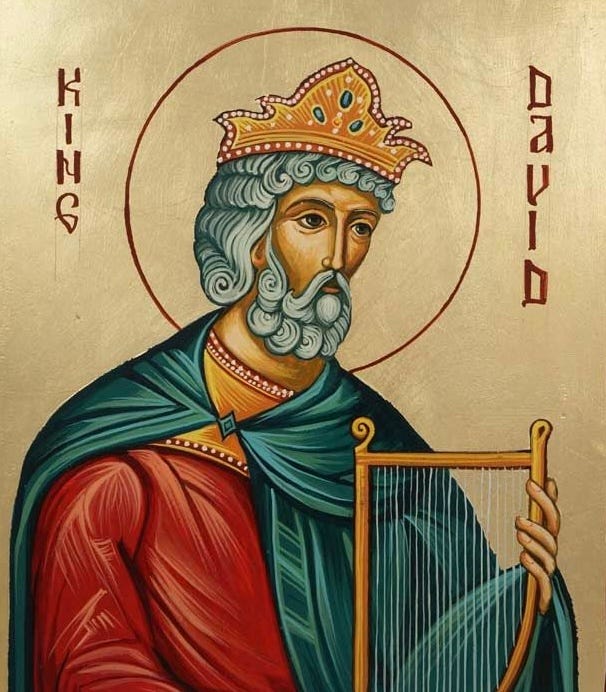During his time in the marshes, King Alfred likely found solace in the Book of Psalms.
One hundred and fifty psalms are collected together, and 73 are written by King David.
They record in verse feelings of despair, descriptions of suffering, petitions for God’s help and songs of thanksgiving. They use a specific style of poetry called parallelism, where a couplet is linked together either sharing the same idea or providing an antithesis.
In King David’s life, there were periods where he fled from his enemies and hid, (much like Alfred). Once from King Saul and once from his son, Absalom.
Psalm 3 v 1-3
A psalm of David. When he fled from his son Absalom.
Lord, how many are my foes! How many rise up against me! Many are saying of me, “God will not deliver him.”
But you, Lord, are a shield around me, my glory, the One who lifts my head high.
Psalm 57 v 1
For the director of music. To the tune of “Do Not Destroy.” Of David. A miktam. When he had fled from Saul into the cave.
Have mercy on me, my God, have mercy on me, for in you I take refuge.
I will take refuge in the shadow of your wings until the disaster has passed.
Psalm 59 v 1-2
For the director of music. To the tune of “Do Not Destroy.” Of David. A miktam. When Saul had sent men to watch David’s house in order to kill him.
Deliver me from my enemies, O God; be my fortress against those who are attacking me.
Deliver me from evildoers and save me from those who are after my blood.
These must have given King Alfred comfort, especially as in both occasions, David recovered his throne. But also the prophecies relating to the messianic hope that someone would be on King David’s throne forever. This was eventually revealed in Jesus Christ. As a Christian king, he trusted his throne was in the hands of Christ.
Alfred would have understood that he was simply the custodian of the throne of Wessex, and this was ultimately under the rule and headship of Christ, the King of Kings. So if he did not return to capture the throne, he would know it was the Lord’s will and in humility he would have to accepted it.
So why am I so convinced the Psalms played an important part in his time in the marshes?
Later in life, he began to translate the Psalms into Old English. He also included an introduction to each one. He only managed to complete 50 psalms before he died, at the age of 50.
At the beginning of each of Psalm, Alfred wrote an introduction. For Psalm 3, he wrote this:
Psalm III
David sang this third psalm when he was lamenting Absalom his son, and he bewailed his misery to the Lord. Everyone who sings this psalm does likewise: he laments his tribulations, of either mind or body, to the Lord, Christ did likewise when He sang this psalm: He sang it of the Jews, and He lamented to the Lord about Judas Iscariot who betrayed Him.*
This introduction shows King Alfred was intimately aware of the Scriptures and was a faithful Christian. He trusted in God and God redeemed the throne for Him, just as He had done for David.
In our lives, the Psalms help us to connect our daily experiences of loss and joy with the eternal God. And in turn, help us to submit our lives to the will of Christ.





Thank you for this. I feel privileged that we llive in the legacy of people like this.
Excellent post. Where can I read the rest of Alfred’s commentaries on the psalms?